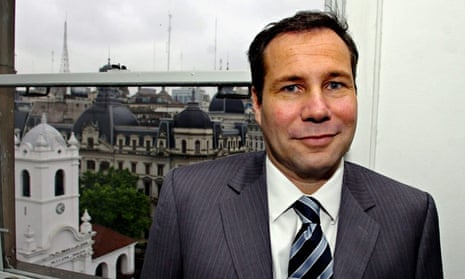An independent forensic report has shown that Alberto Nisman, the special prosecutor who accused Argentinian president Cristina Fernández de Kirchner of a secret conspiracy with Iran, was murdered, his family has said.
Nisman, whose mysterious death in January triggered a political earthquake in Argentina, was found shot dead on 18 January, the day before he was due to testify before Congress that Fernández had conspired to cover up Iran’s alleged involvement in a 1994 attack on a Jewish community centre in Buenos Aires that killed 85 people.
The independent report was presented on Thursday by Nisman’s ex-wife, Judge Sandra Arroyo Salgado.
“Nisman did not have an accident, he did not commit suicide, Nisman was murdered – it constitutes a magnicide of unknown proportions for this country,” Arroyo Salgado told a hushed room packed with reporters.
She underlined that the findings in this report contradicted the few details that have been released from the judicial investigation into Nisman’s death. Full results of the official autopsy have not yet been made public by Argentinian authorities. Though no official ruling has been made on Nisman’s cause of death, the investigation has leaned strongly towards suicide.
Fernández’s government, meanwhile, has wavered back and forth between suggesting it was suicide and a political murder by rogue intelligence agents out to discredit Fernández.
A number of irregularities at the alleged crime scene and the official investigation that followed “have contributed to, or at least extended the duration of, impunity in this case”, Arroyo Salgado said.
Arroyo Salgado, who was divorced from Nisman at the time of his death, is representing the couple’s two daughters, Nisman’s mother and his sister in the investigation.

It was in this capacity that Arroyo Salgado, a well-known judge who has handled several high-profile cases, assembled an independent team of forensic experts to review the results of the court autopsy, as well as the photos and videos taken at Nisman’s apartment.
Arroyo Salgado said the forensic tests found no traces of gunpowder on Nisman’s hand, indicating that he could not have fired the shot which killed him.
“There were only minimal traces of alcohol and tranquilizers in his stomach,” she added, showing that these could not have contributed to a decision by Nisman to kill himself, as government news sites had reported earlier this week. The report indicated that Nisman’s body was moved after his death, Arroyo Salgado said.
The report’s findings also put Nisman’s time of death as late in the evening of 17 January, rather than on the following day as the court investigation publicly stated.
After presenting the report’s conclusions, Arroyo Salgado left the room without answering questions.
The new findings cast a shadow over Viviana Fein, the prosecutor in charge of investigating Nisman’s death, who has long upheld that Nisman killed himself.
Fein quickly responded to Arroyo Salgado’s report, defending the work of her own team. “I am not going to permit my work and the work of my team to be discredited,” she said speaking to reporters on Thursday. “My job is to investigate, discover the truth if the evidence allows me. I am transparent and honest. I am not worried about public opinion.”
Despite defending her position, Fein did say she would be studying the forensic evidence Arroyo Salgado presented. “I don’t feel harassed, she is part of the case, she has the right to make a presentation and I have the obligation of comparing medical reports with the rest of the case.”
The forensic team, who sat by Arroyo Salgado during her presentation, refused to speculate to reporters about whether she will seek to have the investigation transferred to another court. The likelihood of such a move gained credence after Arroyo Salgado recently met with the chief justice of Argentina’s supreme court, Ricardo Lorenzetti.
The family’s findings come one day after Argentina’s government took out full-page advertisements in national newspapers accusing the special prosecutor of destabilising the country.
Fernández has always denied Nisman’s accusations, and since his death, she has continued a one-sided confrontation with the late prosecutor. Last Sunday, she upped the stakes with the suggestion that his death had somehow benefited Israel in its opposition to nuclear talks between US and Iran.

Comments (…)
Sign in or create your Guardian account to join the discussion